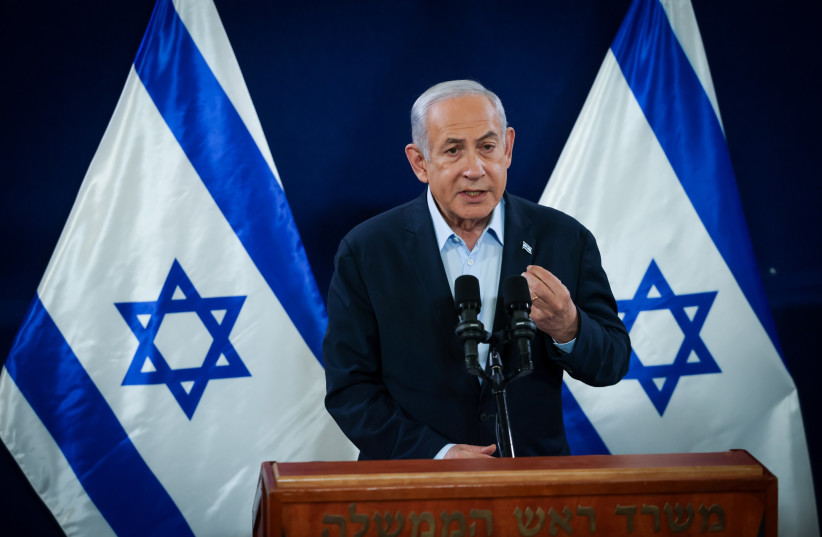Prime Minister Benjamin Netanyahu's public corruption trial resumed Monday in the Jerusalem District Court after a two-month break for the High Holy Days and Sukkot, but a lawyer for the defense requested for fewer hearings due to the ongoing war.
Due to the outbreak of the ongoing war with Hamas in Gaza, the courts operated in an emergency format for urgent hearings only.
At the start of Monday's hearing, attorney Jack Chen, representing Shaul and Iris Elovitch, requested the judges to reduce the number of hearing days to two per week.
Chen explained, "I have been in Gaza since the beginning of the war. I have made a deal with the IDF to come to reservist duty one or two days a week."
He added, "Before the resumption of the hearing, we made an effort to omit six witnesses from the 22 in Case 4000. Most of the witnesses are brief, so the prosecution shouldn't need much time. Under these circumstances, we can advance the trial by having hearings twice a week."

Chen estimates that the prosecution in Case 4000 will finish after approximately 15-16 days of hearings. Yehudit Tirosh from the prosecutor's office responded to Chen's request, stating that they expect to conclude the prosecution's case by January. Additionally, Tirosh estimates that Case 1000 and Case 2000 will require one to two months to complete the lawsuits starting in January.
The judges have yet to decide whether to reduce the hearing days to two or extend them to four days per week. Judge Moshe Bar-Am emphasized the importance of concluding the trial, stating, "We need to end this."
The proceedings against Netanyahu resumed following an order by Justice Minister Yariv Levin. Despite this, another minister, David Amsalem, criticized the trial's continuation, stating, “War? Hostages? Evacuees? Economy? Not at all. What’s most important now is to renew Netanyahu’s trial and distract the prime minister with absurd testimonies and delusional trifles.”
No requests were submitted while the court operated in an emergency format, and there were no unusual events related to the prime minister's files. However, Netanyahu did meet with news company executives such as Avi Weiss from Channel 12, Or Tselkovnik from Channel 13, and Yedioth Aharonot newspaper editor Avi Meshulam. It is worth noting that Netanyahu's lawyers did not inform the court about the meeting, despite Yediot chairman Arnon Mozes being accused of media bribery in Case 2000.
What is Prime Minister Benjamin Netanyahu on trial for?
Case 1000, also known as the Illegal Gifts Affair, accuses Netanyahu of receiving gifts worth approximately NIS 700,000 from businessmen Arnon Milchan and James Packer while serving as prime minister.
The main gifts consisted of cigars, cases of champagne, and jewelry. Moreover, it is alleged that Netanyahu acted in Milchan's favor in three matters at his request, including contacting US secretary of state John Kerry to extend Milchan's visa and contacting finance minister Yair Lapid to extend the tax exemption for returning residents.
Netanyahu is also accused of promoting a merger between media companies Keshet and Reshet at Milchan's behest. These actions are claimed to have damaged the public service's image and public trust.
In Case 2000, known as the Netanyahu-Mozes Affair or the Yediot Aharonot-Israel Hayom Affair, discussions between Netanyahu and Yediot Aharonot publisher Mozes allegedly revolved around improving coverage of the prime minister in exchange for restrictions on competing newspaper Israel Hayom.
The prosecution believes that Mozes proposed the deal and thus accuses him of offering a bribe. Conversely, former attorney-general Avichai Mandelblit believes Netanyahu did not intend to complete the bribery deal but continued the talks to enhance his coverage by Yediot Group. Netanyahu is accused of fraud and breach of trust in this case.
Case 4000, the Bezeq-Walla Affair, is the most significant case for the prime minister. It involves regulatory benefits worth hundreds of millions of shekels allegedly granted to businessman Shaul Elovitch by Netanyahu. In return, Elovitch, along with his wife Iris, is accused of paying bribes and manipulating Walla's coverage, which Elovitch controlled.
